Changing times

As ShelfLife celebrates our milestone 20th anniversary, we asked retailers and industry insiders to reflect on what they believe are the biggest changes that have occurred within the Irish FMCG marketplace over the past two decades
16 September 2014
Leo Crawford, CEO, BWG Group
“The industry was tested to the full when the property market crashed and the recent recession took hold.” – Leo Crawford, CEO, BWG Group
The last 20 years have seen unprecedented changes in the grocery market in Ireland.
The “Celtic Tiger” years led to a significant increase in demand as the population expanded in response to the property boom. New store openings were a feature of this period as was the focus on innovation, in particular in the food-to-go area.
Within BWG, our Spar and Mace brands led the way in many of the initiatives within the convenience sector with the creation of internationally-recognised new store formats and food offerings alongside strategic partnerships.
We also experienced significant shifts in shopping habits as cash rich but time poor consumers sought easier access to readymade food options, including a wider selection of fresh produce. In response, our retailers, including our larger format Eurospar stores, developed differentiated offerings for the breakfast, lunch and evening trade.
However, the industry was tested to the full when the property market crashed and the recent recession took hold.
Against the backdrop of intense competition, including the emergence of the discounters, price and value became the key deliverable for consumers and BWG was quick to react with own-brand emerging as a key offering right across our business.
Notwithstanding the recession, we continued to invest in the business including the acquisition of Morris Brothers, the upgrading of many of our Value Centre Cash & Carry branches and XL stores and the establishment of a new national distribution centre to better service our retailers.
These actions along with the commitment of our staff and the support of our retailers ensured that we navigated our way through one of the most challenging periods in the industry’s history.
Looking to the future, we are delighted to welcome Spar South Africa as a strategic partner and long-term investor in our business, positioning BWG strongly for the future.
We wish ShelfLife continued success and we look forward to them charting the future progress of the industry as comprehensively as they have over the past 20 years.
John Paul O’Reilly, commercial director, Tesco Ireland
Since the Tesco acquisition of Quinnsworth in 1997, the company has expanded its network of stores across the country, from 75 to 146. In addition, we have increased employment from 8,000 to 15,000 colleagues in stores, offices and depots across Ireland. One of the most remarkable changes in the Irish grocery market over the past 20 years has been the development of brilliant new Irish food companies. Irish food is now the best in the world and it is a matter of great pride to be able to go to colleagues in the UK and say you must try Glenilen’s products or Keogh’s Crisps or some other new Irish brand that is now stocked in Tesco stores in the UK or elsewhere in the world. I am really proud that in 20 years Tesco has become the biggest buyer of Irish food and drink products in the world, contributing €2.7 billion to the Irish economy and is able to facilitate the export of €705 million worth of world-class Irish produce to our international stores each year.
“While people are sometimes nostalgic about the past in retailing, technology means there has never been a better time to be a customer as they have such choice and control over their shopping lives.” – John Paul O’Reilly, commercial director, Tesco Ireland
The past two decades have also heralded the most enormous technological changes in retailing and Tesco has been at the forefront of that. The development of smart phones and the busy lives people lead mean that home deliveries, online shopping, Click and Collect where people come in their own time to collect their order, has revolutionised the business. Technology has meant too that people can have more assurance about the provenance of their food and its quality. While people are sometimes nostalgic about the past in retailing, technology means there has never been a better time to be a customer as they have such choice and control over their shopping lives. Here’s to the next two decades of probably even more revolutionary change.
Gary Desmond, CEO, Gala
Gala Retail is delighted to congratulate the ShelfLife team on their 20 year anniversary. Gala Retail has just celebrated 15 years in business and has witnessed an exciting growth in the convenience store market in Ireland during that time. In 1998, 18 wholesale members of Stonehouse (formerly members of NWGA) founded the Gala Retail brand. Today Gala has 10 shareholders with 18 depots servicing over 200 stores including Gala, Gala Express and Checkout stores.
Our group’s strength lies in quality retailing with a community approach, with local wholesaler partnerships at the core of the group’s offering. The Gala ethos is to offer great value for money, great products and great service in this competitive market, whilst keeping one eye on innovation. Essentially, Gala is a national brand with a local focus, a brand that you can trust.
Despite the continuing challenges within the retail environment and the national economy as a whole, the Gala Group stores are performing well in the current market, which is a testament to the growing strength of the Gala offering. Whilst enduring challenges such as the emergence of the discounters, illicit trade and commercial rates concerns, our retailers are reaping the benefits of investing in store rebrands, incorporating new retailing concepts, information technology advancement and most importantly, optimising customer service levels which is being further enhanced by our centralised distribution model. We eagerly await our next 20 years in business.
David Berry, director, Kantar Worldpanel Ireland
Over the past two decades there has been a shift from lots of small independent stores to the one-stop-shop offerings of the big supermarkets as consumers find them more convenient and time-effective rather than shopping around. This change has helped make Ireland one of the most competitive grocery market places in Europe with three major retailers competing head-to-head in Tesco, SuperValu and Dunnes.
“Irish consumers have gradually started to accept retailer own-brands. This trend was started following Quinnsworth’s introduction of its Yellow Pack brand which led the charge for the quality own-brand options available today.” – David Berry, director, Kantar Worldpanel Ireland
As Tesco emerged as a retail powerhouse, we saw the fascias of big brands like Quinnsworth and Crazy Prices rebrand under its umbrella, while more recently SuperValu’s acquisition of Superquinn has further altered the face of the Irish grocery market. The rise of the multiples has meant increased convenience for consumers and more product choice, with the introduction of own-brand goods.
Irish consumers have gradually started to accept retailer own-brands. This trend was started following Quinnsworth’s introduction of its Yellow Pack brand which led the charge for the quality own-brand options available today.
The arrival of Aldi and Lidl in the late 1990s introduced a further mix of brands and more price-competitive choice than ever before adding another layer to the market. The Irish grocery market is a dynamic one and we can expect it to evolve and adapt to meet the changing requirements of its customers.
Deirdre Drennan, Trading and Public Affairs manager ROI, NFRN Ireland
“Long gone, and not missed by any, are the days of tearing the masthead off newspapers and magazines, leading to excessive waste and the cost of its collection.” – Deirdre Drennan, Trading and Public Affairs manager ROI, NFRN Ireland
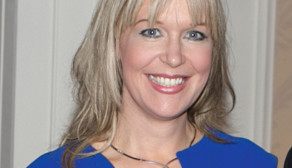 NFRN Ireland would like to congratulate ShelfLife on the achievement of reaching its 20th anniversary. In those two decades retail has dramatically changed on so many levels; some, fortunately, for the better. Long gone, and not missed by any, are the days of tearing the masthead off newspapers and magazines, leading to excessive waste and the cost of its collection. Now the biggest challenge in this area is maintaining sales whilst tablets and apps become more prevalent. The black market of tobacco products has thrived against a backdrop of heavy legislation, which includes the ban on 10 packs, the ban on display and, potentially, plain packaging for all tobacco products. Retail boomed when the Celtic Tiger was roaring and many went bust in the recession. On a positive note retailers continue to play an integral part in their communities not least because of the service they offer.
NFRN Ireland would like to congratulate ShelfLife on the achievement of reaching its 20th anniversary. In those two decades retail has dramatically changed on so many levels; some, fortunately, for the better. Long gone, and not missed by any, are the days of tearing the masthead off newspapers and magazines, leading to excessive waste and the cost of its collection. Now the biggest challenge in this area is maintaining sales whilst tablets and apps become more prevalent. The black market of tobacco products has thrived against a backdrop of heavy legislation, which includes the ban on 10 packs, the ban on display and, potentially, plain packaging for all tobacco products. Retail boomed when the Celtic Tiger was roaring and many went bust in the recession. On a positive note retailers continue to play an integral part in their communities not least because of the service they offer.
Jim Barry, managing director, the Barry Group
Technology, both at the point of sale, and the back-end logistics of supermarket supply was in its total infancy in 1994.
An electronic register was the height of sophistication, with its green LED display; but it was a stand-alone piece of technology that basically added up.
“In 1994, organic food was a very niche area, and the supply chain for organics was hit and miss! At best, you had a small collection of organic fruit and vegetables, which most shoppers viewed suspiciously; and looking for a gluten-free or dairy-free alternative would have been like looking for Shergar!” – Jim Barry, managing director, the Barry Group
The great advances in 20 years, as with all technology, is the extent of integration now – the fact that what the customer buys at the till is instantly tracked, prompts re-order, sales planning and marketing; provides the logistics information that sees us operate automated warehouses, with advanced stock-control and picking systems; for loading onto our temperature controlled vehicles, operating on routes determined by sophisticated computer programmes, to maximise load and fuel efficiency etc.
God be with the days when the shopkeeper noticed a gap on the shelves, rang the warehouse, and the manager there took down an order on a good old fashioned duplicate book, with a copy for the accounts department, and another copy for the picker!
Through that same EPOS technology, retailers now have the scope to track customers’ purchasing behaviour. They provide them with loyalty cards, to track their individual brand preferences and frequency of purchase even further, and to try to influence purchasing decisions further again, anticipating every consumer need.
But, when you have been around retailing for as long as I have, you still get that nostalgia for the days when retailers knew what their customers wanted, because they actually spoke to them – they served them at a till, they met them out and about in the community, and they listened to what shoppers had to say.
It will be a sad day for Irish retailing when the supreme technology of directly communicating with people, and actually listening, becomes obsolete! I am happy to say that, within the Barry Group, talking to our staff and our customers, at both wholesale and retail level, is a prime driver of our business.
I am immensely proud of the fact that in the past 20 years, the Barry Group has supported over 1,000 independent Irish retailers in adapting to the latest in-store and supply technology, developing premium own-brands, and building a range and customer service proposition to rival any of the multinationals that have hit our shores in the past 20 years.
Throughout the years, the Barry Group has worked with the ShelfLife editorial and sales teams on countless features and news items and on every occasion, their professionalism and excellent service levels have shone through. The growth and consistent raising of standards from the magazine and their recently renovated website proves the future will be one of sustained success for ShelfLife.
Tara Buckley, director general, RGDATA
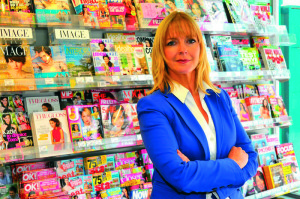 What a dramatic transformation the retail grocery sector in Ireland has seen in the past 20 years. However, one thing remains constant: independent shops remain at the heart of this every evolving industry.
What a dramatic transformation the retail grocery sector in Ireland has seen in the past 20 years. However, one thing remains constant: independent shops remain at the heart of this every evolving industry.
In 20 years, we’ve seen the rise of German and UK multiples, the end of the Groceries Order, the growth in symbol group membership and the expansion of own brand products. In 1994, mobile phone top ups, online marketing, self-service checkouts and in store payment services were not even on the radar.
“Top of the RGDATA agenda in 1994 was a JLC sick pay scheme, the National Lottery retail agent’s margin and alcohol licensing – some things never change!” – Tara Buckley, director general, RGDATA
Independent grocers have become convenience retailers. Luckily they have retained their nimbleness and agility and continue to adapt to the changing marketplace and embrace the opportunities it creates. However, in this sea of change, their core principle remains the same: to provide excellence in local community retailing. RGDATA members remain as committed to their communities as they did 20 years ago. They provide 90,000 local jobs and remain the biggest supporters of local suppliers and community initiatives.
Dusting off the RGDATA records from 1994 it’s clear that, although everything has changed, much has stayed the same. Independent retailers’ steadfast determination to survive and thrive remains constant. Top of the RGDATA agenda in 1994 was a JLC sick pay scheme, the National Lottery retail agent’s margin and alcohol licensing –some things never change!
Aoife Clarke, head of Communications, Lidl Ireland
 The Irish grocery market has changed hugely in the past 20 years. The emergence of a more savvy and informed customer has meant that companies need to focus more on their offering and meeting the needs of their customers in a more demanding market.
The Irish grocery market has changed hugely in the past 20 years. The emergence of a more savvy and informed customer has meant that companies need to focus more on their offering and meeting the needs of their customers in a more demanding market.
“There is no doubt our own perspective on the market has changed massively – our focus on locally sourced products is something we have highlighted over the last few years.” – Aoife Clarke, head of Communications, Lidl Ireland
The entry of Lidl into the Irish market in 2000 brought a new dimension to retailing in Ireland and I think that our focus on development of our own-label lines has shown the Irish public that it is possible to get a high quality product at a competitive price.
There is no doubt our own perspective on the market has changed massively also – our focus on locally sourced products is something we have highlighted over the last few years to build trust and faith in our brand. We also recognised at an early stage that there was potential to engage with customers in a more informal way through social media and since July 2010 have been building a very successful Facebook page, which now stands at over 387,000 fans – making us the number one grocery retailer on Facebook in Ireland.
Conor Hyde and Kieran O’Connor, founders of Bullseye Food Marketing
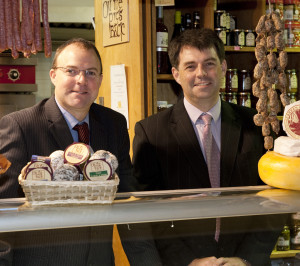 Conor Hyde, Bullseye’s CEO noted that “Ireland’s food and drinks sector has transformed over the past twenty years, however we must continue to grow not only brand Ireland but also to develop a portfolio of strong and identifiably Irish brands that international consumers can relate to.
Conor Hyde, Bullseye’s CEO noted that “Ireland’s food and drinks sector has transformed over the past twenty years, however we must continue to grow not only brand Ireland but also to develop a portfolio of strong and identifiably Irish brands that international consumers can relate to.
“The opening of new markets, through programmes like the EU-USA Transatlantic Trade and Investment Partnership (TTIP) will bring more competition to the Irish food and drinks sector, but it also opens up new and exciting opportunities to get branded Irish products onto supermarket and specialist grocery store shelves as well as restaurant menus all over the world.
“Ireland’s highly innovative food retail sector has also gone through a revolution over the past twenty years and is now amongst the most sophisticated in the world. Strong retailer and consumer support for local goods continues to give Irish food and drinks SMEs an opportunity to develop world-beating products and brands that appeal to both Irish and international consumers.”
The Irish food and drinks sector is one of the major drivers behind our economic recovery and our largest indigenous industry. The value of Irish food and drink exports approached €10 billion for the first time in 2013, according to figures released by Bord Bia. This represents an increase of 9% on the previous year and 40% in the last four years with revenues almost €3 billion higher than in 2009.
Bullseye’s Kieran O’Connor observed that “we continue to see massive growth in food entrepreneurial activity. This is encouraging more people to consider a career in the sector. It is great to see that it’s now a focal point for new graduates and people seeking professional change.
“It’s interesting to note that the 2013 CAO figures show that the highest increase in applications for third-level courses last year was seen in food-related courses. We’ve also observed that many new food start-ups being created by people who have changed careers. Many of these entrepreneurs bring with them a wealth of knowledge and experience from other sectors that is highly applicable to the food industry.
“We look forward to the opportunities and finding innovative solutions to the challenges that lay ahead over the next 20 years for Ireland’s food and drinks sector.”
Vincent Jennings, CEO, CSNA reflects on the organisation’s strong working relationship with ShelfLife over the past 20 years
 For those in retail, particularly those in the newsagent and convenience store sector, it would be difficult to imagine a month without ShelfLife.
For those in retail, particularly those in the newsagent and convenience store sector, it would be difficult to imagine a month without ShelfLife.
It continues to inform us on matters that are relevant, whether it is about legislative changes or retail products.
ShelfLife has not stood still over the past 20 years, it remains as relevant today as it was when it was first published.
“We have never been subjected to editorial constraints, and although we are very aware that a trade magazine needs to keep their advertisers happy, have never been asked to “tone down” any observations.” – Vincent Jennings, CEO, CSNA
The association has always had excellent relations with the publishers and staff and have been happy to provide to both our members and all other ShelfLife readers with our viewpoint, both in our dedicated page and throughout the magazine.
We have never been subjected to editorial constraints, and although we are very aware that a trade magazine needs to keep their advertisers happy, have never been asked to “tone down” any observations that may be considered negative to a sector or individual supplier.
To John, Colette, Fionnuala and their team in ShelfLife, we wish you all the best and thank you for continuing to inform and promote the independent retail sector.
Alan O’Neill, MD of Kara Change Management (www.alan-oneill.com)
As a consistent messenger, occasional messiah and sometimes ‘tell-tale tattler’, ShelfLife is a most reliable industry icon. The significant changes that we have seen in the industry both on the supply side and on the shop floor, have been well documented by the magazine. Congratulations on the team’s 20th anniversary!
The past is jam-packed with changes driven by lifestyles, technology and economics. And more is guaranteed in the future as the pace, the volume and the complexity of change accelerates. But there are some fundamentals in the industry that have not and will not change – such as the importance of great customer service.
When service is truly prioritized, it ensures repeat footfall, encourages conversion across departments and drives up average transaction values. Footfall x Conversion x Average Spend = Sales is an age-old retail formula that easily applies to the supply side too.
So I look forward to the continued great voice of the customer reporting from ShelfLife over the next 20 years.
Darragh Fanning, managing director, Celtech Software Group
Twenty years ago broadband didn’t exist as a way to communicate with stores, it was primarily dial-up over basic telephone lines using ‘screechy’ PSTN modems that might reach 14.4kps if the connection was good. The focus was on minimising and compressing data for transmission, to reduce call time and charges. Every evening, head office users would have to come off the system to allow the nightly extract and communications process with stores to begin. The stores also had to exit the system and put it into night mode. Every morning head-office IT had to manually connect with stores that would have inevitably failed. If there were too many stores to ‘poll’ each night a ‘rolling polling’ system was adopted to link with different stores each night of the week. As a result it could take a week to get sales information for all stores and at least another week to fix any pricing issues.
Over the last 20 years, ShelfLife has been invaluable in providing the latest news and insights that have helped us to shape our technology and service strategy to best serve the ever changing needs of retailers.
Sean Kenna, MD, CBE
The Irish grocery market has evolved dramatically in the last 20 years. Whilst customer service, quality produce and value for money are still as important today as they were 20 years ago, it is in the technology sphere where Irish retailers have excelled.
CBE installed its first scanning solution in Ireland in the early 90s, installed the first site with credit card in 1997, installed the first integrated fuel site in 1998 right up to the adoption of self-checkout in 2009. Over the past 20 years, Irish retailers have embraced technology and are renowned for their progressive adoption of new innovations.
For 20 years ShelfLife has been at the forefront of highlighting future trends and espousing the benefits of technology to the retail industry. On behalf of all the staff at CBE we would like to congratulate the team at ShelfLife for the tremendous achievement on reaching 20 years in the publishing industry and wish you continued success in the future.
Brian Keogh, sales director at Flanagan’s Foods
The Irish FMCG market has certainly undergone some dramatic changes over the past 20 years. ShelfLife magazine has been a crucial piece in guiding both retailers and suppliers alike through this perplexing labyrinth.
Like ShelfLife, Flanagan’s Foods has customised and adapted to address the consistent market changes on this journey. With the flexibility to modify our sales support to the changes in centralisation of purchasing and supply chain, addressing the decline in the number of independent grocery stores, we have adapted where needed. Also, by supporting the growth of the symbols, whilst still addressing the growth of the discounters and the convergence of the UK and Irish markets in this time, this has indeed been a period of rapid change for progressive suppliers.
Combine these changes to the FMCG market landscape with the fast moving technological advances, rapidly changing consumer promotional and marketing strategies (both traditional and digital) and the growing demand for omni-channel shopping it is easy to see how suppliers who don’t advance and change with the market will be left behind.
It is almost impossible to look back at the last 20 years without witnessing the scars remaining from the recent economic upheaval both globally but more importantly here in Ireland. These events severely affected this market in 2008, dramatically changing the purchasing habits and behaviours of Irish consumers, retailers and suppliers which will continue well into the future.
ShelfLife has been instrumental in guiding retailers and suppliers alike throughout this period. By engaging with ShelfLife, the FMCG market in Ireland has an interactive relationship and a clear focus with a common goal of educating each other and maximising profits and productivity in this sector.
Stephen O’Riordan, chief executive, Londis
It is coincidental that ShelfLife should celebrate its twentieth anniversary as ADM Londis celebrates our sixtieth year. Over the magazine’s lifetime and ours change remains the great constant of the Irish grocery market. We’ve seen the introduction of the euro and the rise of multichannel retailing as well as marked shifts in consumer purchasing behaviour, driven by the unprecedented economic upheaval of recent years.
Notwithstanding these changes, I believe that the repeal of the Groceries Order in 2005 warrants specific mention given its impact for retailers. A move that could have proven catastrophic for the independent retail sector, instead became a catalyst for locally based, resourceful independent retailers to innovate and thrive. Despite the presence of the larger, better-resourced multiples who could afford to absorb significant losses through unsustainable below-cost selling, Irish symbol groups have adapted to become an integral – and for the most part – locally owned, competitive retail force. Substantial investment has meant more choice, better service and surprisingly compelling value for our customers.
For Londis, much of our investment to bring the lowest possible prices to consumers has focussed on innovation and best use of technology to drive efficiencies throughout the supply chain from point of order to delivery and merchandising. Increasing productivity and minimising costs has been crucial to ensure we deliver excellent value prices to our consumers and at sustainable margins for our retailers. As we celebrate our sixtieth anniversary, these investments will ensure that Londis and our independent retailers will continue to deliver enjoyable and competitive shopping experiences to consumers in communities across Ireland.
As an industry we have noted and appreciated ShelfLife’s parallel investment to ensure that we, your readers, benefit from your superb content in a manner that best suits our needs. Huge congratulations Fionnuala and the team at ShelfLife as you celebrate this milestone birthday.
Paul Fitzsimmons, head of Communications, Musgrave Retail Partners Ireland, shares his thoughts on the retailer’s working relationship with ShelfLife over the past two decades
 “It has been a pleasure to work with ShelfLife over the last 20 years. The insights the magazine brings to the retail sector in terms of emerging consumer behaviour trends, developments in innovation and general retail news is invaluable and that’s why it has become an institution for all those involved in the industry. We wish the team at ShelfLife all the very best on their 20th anniversary and look forward to continuing our relationship with the publication long into the future.”
“It has been a pleasure to work with ShelfLife over the last 20 years. The insights the magazine brings to the retail sector in terms of emerging consumer behaviour trends, developments in innovation and general retail news is invaluable and that’s why it has become an institution for all those involved in the industry. We wish the team at ShelfLife all the very best on their 20th anniversary and look forward to continuing our relationship with the publication long into the future.”
Colin Breslin, group buying director, Aldi Ireland
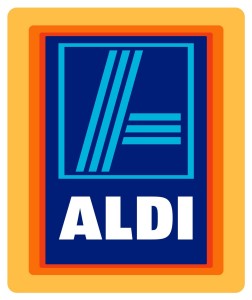 Aldi has been one of the standout success stories of the Irish economy over the last decade. Since opening our first Irish stores in 1999, we have grown at an exceptional rate, shaking up Ireland’s retail landscape and changing how more and more Irish families shop every day.
Aldi has been one of the standout success stories of the Irish economy over the last decade. Since opening our first Irish stores in 1999, we have grown at an exceptional rate, shaking up Ireland’s retail landscape and changing how more and more Irish families shop every day.
According to Kantar Worldpanel figures, we are the fastest growing retailer in Ireland and have been so for over six years. We have developed a store network of 110 stores and now have a presence in every county in the Republic of Ireland, bringing exceptional quality and value to Irish customers each and every day.
Our focus in Ireland has been about delivering the very best quality products at the lowest possible prices for Irish consumers. We have seen a real change in the consumer landscape as customers realise they do not have to pay brand prices to get brand quality. We have invested heavily in growing and expanding our Irish sourced range and over 50% of our supplier spend is now with Irish suppliers, producers and manufacturers. Since 2008 Aldi has almost doubled the number of Irish suppliers it works with.
The supreme quality of the products we offer has won over Irish consumers. Aldi is the most awarded Irish retailer in the last five years across the Great Taste Awards, Blas na hÉireann National Irish Food Awards and Irish Quality Food and Drink Awards, which is testament to the quality of our suppliers and the enduring sustainable relationships we have built with them.
Tom Shipsey, CEO of Stonehouse Marketing
Happy 20th birthday to ShelfLife. Well in 1994 we were getting used to fax but still had a telex in the office. The world was still a mess, Russia invaded Chechnya and hundreds of thousands Tutsi were massacred in the Rwandan genocide. There was hope in the Middle East with Arafat, Perez and Rabin winning the Nobel Peace Prize and hope in Ireland with the IRA declaring a cessation of “military operations”. South Africa too had a great sense of new beginnings with Nelson Mandela becoming the first black president. OJ Simpson went on that famous car chase after his ex-wife was found dead and Ireland beat Italy one nil in the World Cup in the Giants Stadium, NY.
To make you feel really old, Justin Bieber and Saoirse Ronan were born and Tip O’Neill, Ayrton Senna and Jacque Kennedy died. Sony launched the PlayStation. We hosted and won the Eurovision again and Riverdance had its first outing at the interval. The General Martin Cahill was assassinated. ShelfLife was launched and Fianna Fail elected Bertie as its new leader.
1994 was an interesting year, I am not sure what history teaches us. Happy birthday to John, Colette and all the team!
Like ShelfLife, FMI is also celebrating its 20th anniversary this year. Margaret Lyons, owner and CEO at FMI talks to us about how the company was born and its achievements over the past two decades
PIC: Margaret Lyons
PIC: FMI logo
Where did the idea come from to start this company?
FMI, which stands for Field Management Ireland, was set up in 1995 as the Irish arm of a UK field marketing company. Initially, I was tasked with looking after our UK clients who were expanding in the Irish market. I recognised a more substantial and longer-term opportunity existed if I could focus independently on building an Irish business.
Today, FMI offers clients the expertise and manpower behind sales, merchandising, IT and auditing, promotions and brand activation campaigns for well-known brands including Electric Ireland, the Musgrave Group, Mondelez, Glanbia, UPC, Keeling’s, and many more.
When you started out, what were your goals for the first five years in business?
My goal was very clear; I wanted FMI to work with the leading branded goods companies across every sector of business and to this day this continues to be our goal.
In order to achieve this I believed that we had to hire a strong team that consistently added value for our clients. I also wanted to create an efficient business model for FMI which would allow us to be more efficient and profitable.
How has the market changed in the past 20 years and how has FMI changed to allow for this?
In the early days Texaco was a large client, but a changing market environment meant that by 2006 we diversified into direct sales, including residential and retail sales. We made a conscious decision to continue our philosophy of investing in people and although this meant increasing upfront costs before generating income, this decision was driven by a desire to demonstrate professionalism to the companies that we represent – UPC and Electric Ireland.
How many staff do you employ today?
Today, FMI employs approximately 700 people on our weekly payroll nationwide. We find that we have a lot of long-term staff and a high level of loyalty to the company. Many of our supervisors have been with us since the beginning and recruit, train and manage their own teams nationwide.
Are you still very involved in the day to day running of the business?
I am still involved in the day to day running of the business but my philosophy has always been to develop a very strong senior management team who are focussed and dedicated on getting the job done and feel empowered to grow and develop the business.
Do you still believe there is room for growth in this business and where will it come from?
Yes, absolutely. From its very beginnings, FMI recognised that there was a gap in the Irish market and capitalised on it. This year, as we approach celebrating 20 years in business FMI is expanding our services including outsourced training services, recruitment and a contact centre. Growth will come from developing existing client relationships, moving into new sectors and expanding our service offering.
Where will the company be in 20 years’ time?
We are ultimately a people company and that won’t change – we will always manage people who will be selling on behalf of our clients. Ongoing investment in technological developments will ensure our clients’ success plays a continuous role in our journey for the next 20 years!



 Print
Print
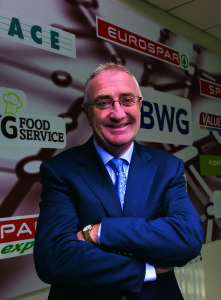




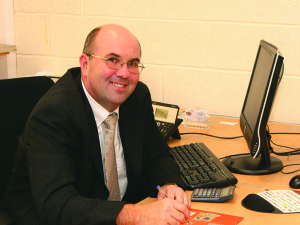

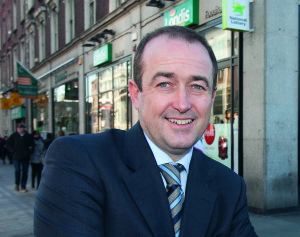

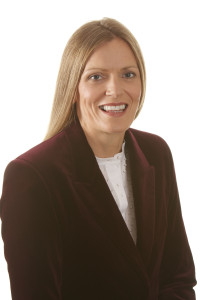



Fans 0
Followers